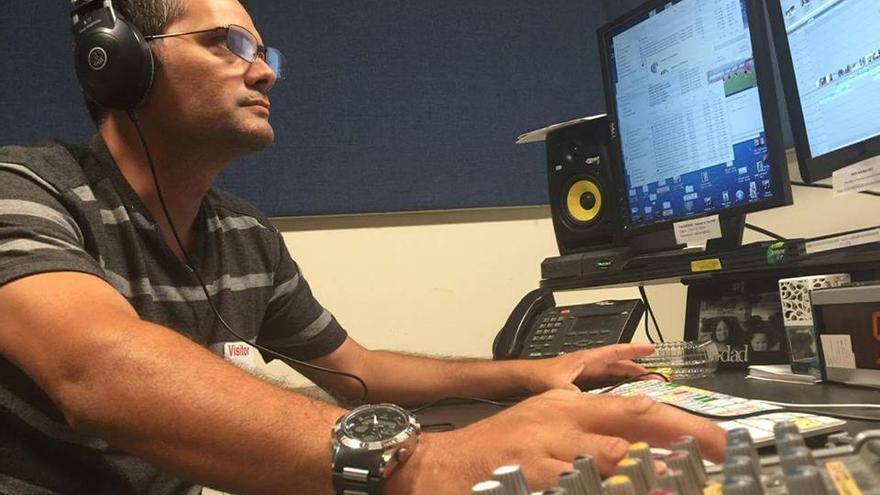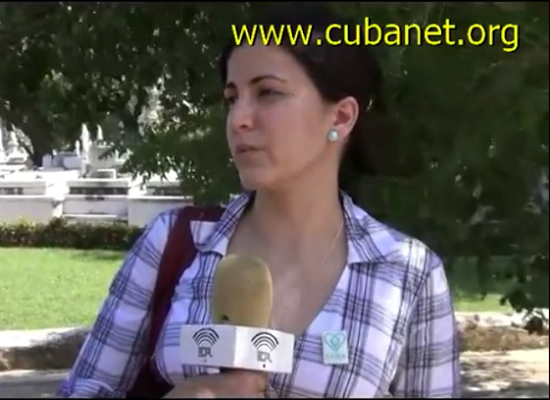
![]() 14ymedio, Havana, 14 August 2019 — The independent journalist Ignacio González has made an emotional complaint about the alleged medical negligence suffered by his wife at the Calixto García Hospital in Havana. The reporter says that the results of a medical test essential to diagnosis her disease was never delivered to the doctors.
14ymedio, Havana, 14 August 2019 — The independent journalist Ignacio González has made an emotional complaint about the alleged medical negligence suffered by his wife at the Calixto García Hospital in Havana. The reporter says that the results of a medical test essential to diagnosis her disease was never delivered to the doctors.
In a text that González sent to the editorial office of 14ymedio, he explains that his wife, Kenya Leyva Rodríguez, 47, was hospitalized on June 25 and underwent surgery due to peritonitis derived from an ovarian cyst. The operation was successful and two weeks later the doctors discharged her.
A month later, according to González’s testimony, his wife became ill with pneumonia and doctors detected a metastasis from a previously undiagnosed tumor. Apparently, doctors never received the results of the tissue sample that was removed in the previous surgery and that was apparently sent to the laboratory. continue reading
The patient’s health has worsened because she is not receiving five of the seven medications prescribed by doctors because the drugs are unavailable in the hospital network. Drug shortages in Cuba have worsened in the last year and a half due to problems with the sourcing of raw materials from abroad, according to officials from the BioCubaFarma group.
“My daughter is being asked to be the one to look in the files and investigate where this result [the biopsy] is, as they are passing their responsibility on to her,” laments the independent journalist, who in a video broadcast on Facebook also denounces an act of “sexual harassment” against his daughter by one of the male nurses on duty.
“I hold the director of the Calixto García Hospital, Alberto Martìnez, responsible for the life of my wife and daughter,” Gonzalez said, visibly upset, and claimed that “the person responsible for this fatal event should pay for it.”
Medical malpractice cases are frequently reported on social networks in Cuba but rarely are the doctors involved legally prosecuted, since they are protected by the hospitals from any criminal claim. The official press also does not publish information on Public Health professionals who make diagnostic or treatment errors, and few lawyers accept cases of this type.
The few cases that reach the courts are treated as homicides. When the crime has allegedly been committed by medical personnel, Instruction 110 issued by the Supreme Court in 1983 is also taken into account that addresses homicides or injuries arising from the “exercise of their respective specialties.”
Apart from prosecution, a Medical Commission appointed by the Provincial Director of Public Health is responsible for writing an expert report on the cases.
The founder of En Caliente Prensa Libre , Ignacio González, also denounced that because of his work, his wife was fired from her job the Carlos III shopping center. “She was an exemplary worker recognized by her co-workers. Almost a year ago she was informed that she had no contract, when she did, and she was even paying the State license fee to work there, as a restroom attendant, but still they fired her.”
He explains that his wife continued to pay the license each month, while still out of work, and showed the documents to her superiors. “She fought with all her strength, she went everywhere she needed to go to protest her unfair firing from that complex that is administered by the Revolutionary Armed Forces (FAR). And she never got an answer. ”
To González it was very evident that “the wife of a CR [counter-revolutionary],” a category that State Security applies to independent opponents, activists and journalists, “could not remain in a commercial institution run by the FAR.” He says that this injustice had not been denounced before at the request of his wife, who still had the “hope” that “justice would be done.”
_____________________
The 14ymedio team is committed to serious journalism that reflects the reality of deep Cuba. Thank you for joining us on this long road. We invite you to continue supporting us, but this time by becoming a member of 14ymedio. Together we can continue to transform journalism in Cuba.


